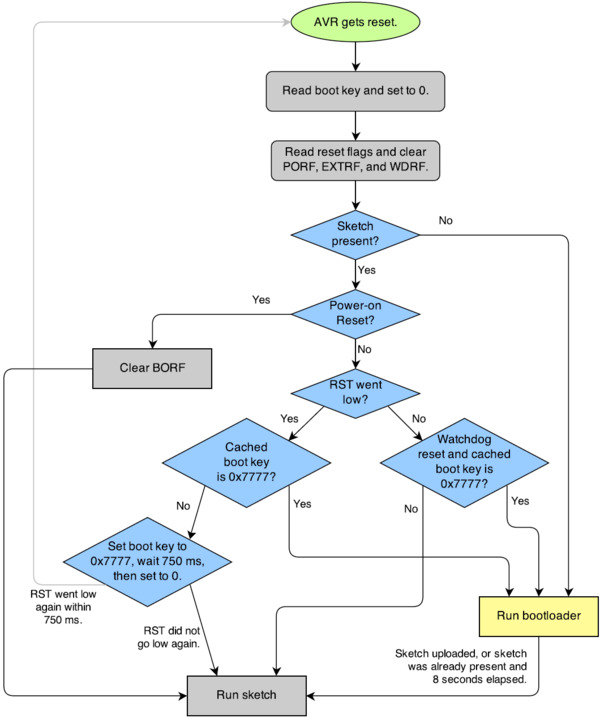Support » Pololu 3pi+ 32U4 User’s Guide »
9. The A-Star 32U4 Bootloader
Our 32U4 family of boards come with a USB bootloader that can be used in conjunction with the Arduino IDE or AVRDUDE to load new programs onto the device. This section documents some technical details of the bootloader for advanced users who want to better understand how it works. If you just want to get started using your device, it is fine to skip this section.
The A-Star 32U4 Bootloader is based on the Caterina bootloader, which is the bootloader used on the Arduino Leonardo, Arduino Micro and several other ATmega32U4 boards. The bootloader is open source and its source code is available on GitHub. The bootloader occupies the upper four kilobytes of the ATmega32U4’s program memory, leaving 28 KB for the user program. The bootloader’s USB interface consists of a single virtual serial port that accepts the programming commands defined in AVR109. The bootloader always runs first immediately after the AVR is reset.
Startup logic
The main difference between the A-Star 32U4 Bootloader and Caterina is in the startup logic. This is the part of the bootloader that runs immediately after the AVR is reset, and it decides whether to run the user program or run the rest of the bootloader. The startup logic of the Caterina bootloader is designed so that when the RST line goes low, the bootloader will run. This means that if you want to restart your program using the RST line, it will take 8 seconds before the bootloader times out waiting for an upload and the sketch starts.
The A-Star 32U4 Bootloader has different startup logic that allows you to use the RST line to reset the board with a smaller delay. If the RST line goes low once, the user program will run after a 750 ms delay. If the RST line goes low twice within 750 ms, then the bootloader will run. (This behavior is the same as on boards like SparkFun’s Pro Micro.)
The start-up logic of the A-Star 32U4 Bootloader is shown in the flowchart below:
 |
The startup logic for the A-Star 32U4 bootloader. |
|---|
Brown-out detection
Unlike many other ATmega32U4 boards, our 32U4 family of boards have brown-out detection enabled. The brown-out threshold is 4.3 V, and if the voltage on VCC goes below this then the AVR will reset. The bootloader was designed so that the user program can detect brown-out resets. To do so, check to see if the BORF bit in the MCUSR register is set, and then clear it later. Here is some example code you could put in your setup function for detecting brown-out resets:
pinMode(13, OUTPUT);
if (MCUSR & (1 << BORF))
{
// A brownout reset occurred. Blink the LED
// quickly for 2 seconds.
for(uint8_t i = 0; i < 10; i++)
{
digitalWrite(13, HIGH);
delay(100);
digitalWrite(13, LOW);
delay(100);
}
}
MCUSR = 0;










